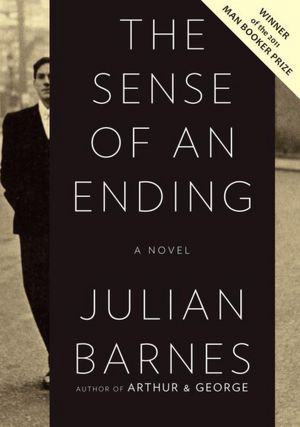Best Fiction of the Decade: The Sense of an Ending by Julian Barnes (2011)
A series of posts on my most unforgettable, must-read books of the past decade.
A series of posts on my most unforgettable, must-read books of the past decade.
I can’t resist a good end-of-decade list, especially when it involves books. This decade was full of great reads and in this series of posts, I thought I would revisit some of my favorites published during the past 10 years.
Have I recommended this book to you yet? No?
Well, The Sense of an Ending has become my default answer to everyone who asks me for a good book to read — and it will be for some time to come. Because, you know, when people know you’re an avid reader, all of a sudden you’re their go-to girl for all the good books to read. Which, is not a bad thing. (Sometimes.)
I digress. I can also sum up this review in four words.
I. LOVED. THIS. BOOK.
I mean, I’m talking I loved everything about this little book. Usually there’s something that my critical, nit-picky self can find fault with. Not here. The well-defined characters, the gorgeous writing (I could quote from this all day), how Julian Barnes packed SO MUCH into so few pages … it’s so well worth being named the winner of the 2011 Man Booker Prize, and you know me when it comes to book prizes — I kind of eschew them. Take ’em or leave them. But The Sense of An Ending deserves every accolade and then some.
Really, if there’s anything I don’t like about this it is the publisher’s description, which says that this
intense novel follows Tony Webster, a middle-aged man, as he contends with a past he never thought much about — until his closest childhood friends return with a vengeance: one of them from the grave, another maddeningly present. Tony thought he left this all behind as he built a life for himself, and his career has provided him with a secure retirement and an amicable relationship with his ex-wife and daughter, who now has a family of her own. But when he is presented with a mysterious legacy, he is forced to revise his estimation of his own nature and place in the world.
That makes The Sense of an Ending sound sort of freakish and a bit sinister. That’s NOT what this is. Rather, this is a gorgeous novel about time and memory.
“We live in time — it holds us and moulds us — but I’ve never felt I understood it very well. And I’m not referring to theories about how it bends and doubles back, or may exist elsewhere in parallel versions. No, I mean ordinary, everyday time, which clocks and watches assure us passes regularly: tick-tock, click-clock. Is there anything more plausible than a second hand? And yet it takes only the smallest pleasure or pain to teach us time’s malleability. Some emotions speed it up, others slow it down; occasionally, it seems to go missing — until the eventual point when it really does go missing, never to return.”
More, please. With those exquisite lines, Barnes had me absolutely hooked on this story. The first section, which illuminated Tony’s school days (and those of his close friends, Alex, Colin, and Adrian), has a “Dead Poets Society” feel to it.
“In those days, we imagined ourselves as being kept in some kind of holding pen, waiting to be released into our lives. And when that moment came, our lives — and time itself — would speed up. How were we to know that our lives had in any case begun, some damage already inflicted?”
I could quote from this book all day, but that would just prevent you from reading it. Speaking of which, some other reviewers have said that this is a book that is meant to be read in one sitting — and I completely agree. I’d even go so far as to say that The Sense of an Ending would even make for a good, intelligent beach book for those who enjoy reading something of substance along with their sand and surf.
“We knew from our reading of great literature that Love involved Suffering, and would happily have got in some practice at Suffering if there was an implicit, perhaps even logical, promise that Love might be on its way.
This was another of our fears: that Life wouldn’t turn out to be like Literature. Look at our parents — were they the stuff of Literature? At best, they might aspire to the condition of onlookers and bystanders, part of a social backdrop against which real, true, important things could happen. Like what? The things Literature was all about: love, sex, morality, friendship, happiness, suffering, betrayal, adultery, good and evil, heroes and villains, guilt and innocence, ambition, power, justice, revolution, war, fathers and sons, mothers and daughters, the individual against society, success and failure, murder, suicide, death, God. And barn owls.”
Brilliance. How can you not love writing like this?
I certainly do.
Other posts in this series:
Best Fiction of the Decade: Bad Marie by Marcy Dermansky (2010)
A series of posts on my most unforgettable, must-read books of the past decade.medium.com
Best Fiction of the Decade: American Music by Jane Mendelsohn (2010)
A series of posts on my most unforgettable, must-read books of the past decade.medium.com





